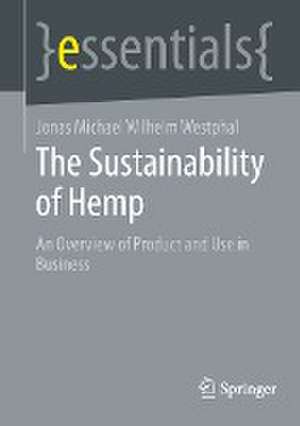The Sustainability of Hemp: An Overview of Product and Use in Business: essentials
Autor Jonas Michael Wilhelm Westphalen Limba Engleză Paperback – 23 iun 2023
Din seria essentials
-
 Preț: 89.25 lei
Preț: 89.25 lei -
 Preț: 89.06 lei
Preț: 89.06 lei -
 Preț: 89.47 lei
Preț: 89.47 lei -
 Preț: 89.47 lei
Preț: 89.47 lei -
 Preț: 90.88 lei
Preț: 90.88 lei -
 Preț: 73.76 lei
Preț: 73.76 lei -
 Preț: 88.86 lei
Preț: 88.86 lei -
 Preț: 90.70 lei
Preț: 90.70 lei -
 Preț: 46.20 lei
Preț: 46.20 lei -
 Preț: 89.97 lei
Preț: 89.97 lei - 5%
 Preț: 82.54 lei
Preț: 82.54 lei -
 Preț: 123.11 lei
Preț: 123.11 lei -
 Preț: 89.06 lei
Preț: 89.06 lei -
 Preț: 90.16 lei
Preț: 90.16 lei -
 Preț: 90.18 lei
Preț: 90.18 lei -
 Preț: 89.24 lei
Preț: 89.24 lei -
 Preț: 89.47 lei
Preț: 89.47 lei -
 Preț: 89.88 lei
Preț: 89.88 lei -
 Preț: 88.49 lei
Preț: 88.49 lei -
 Preț: 88.49 lei
Preț: 88.49 lei -
 Preț: 88.86 lei
Preț: 88.86 lei -
 Preț: 89.06 lei
Preț: 89.06 lei - 5%
 Preț: 85.47 lei
Preț: 85.47 lei -
 Preț: 89.88 lei
Preț: 89.88 lei -
 Preț: 88.15 lei
Preț: 88.15 lei -
 Preț: 87.80 lei
Preț: 87.80 lei -
 Preț: 88.36 lei
Preț: 88.36 lei -
 Preț: 88.79 lei
Preț: 88.79 lei -
 Preț: 89.84 lei
Preț: 89.84 lei -
 Preț: 89.47 lei
Preț: 89.47 lei - 5%
 Preț: 84.42 lei
Preț: 84.42 lei -
 Preț: 89.91 lei
Preț: 89.91 lei -
 Preț: 93.57 lei
Preț: 93.57 lei -
 Preț: 75.98 lei
Preț: 75.98 lei -
 Preț: 122.96 lei
Preț: 122.96 lei -
 Preț: 90.06 lei
Preț: 90.06 lei -
 Preț: 88.92 lei
Preț: 88.92 lei -
 Preț: 88.49 lei
Preț: 88.49 lei -
 Preț: 88.15 lei
Preț: 88.15 lei -
 Preț: 90.47 lei
Preț: 90.47 lei -
 Preț: 92.44 lei
Preț: 92.44 lei -
 Preț: 89.65 lei
Preț: 89.65 lei -
 Preț: 89.47 lei
Preț: 89.47 lei -
 Preț: 73.76 lei
Preț: 73.76 lei -
 Preț: 89.41 lei
Preț: 89.41 lei -
 Preț: 26.24 lei
Preț: 26.24 lei -
 Preț: 87.80 lei
Preț: 87.80 lei - 5%
 Preț: 69.91 lei
Preț: 69.91 lei -
 Preț: 86.39 lei
Preț: 86.39 lei
Preț: 124.10 lei
Nou
Puncte Express: 186
Preț estimativ în valută:
23.75€ • 24.97$ • 19.62£
23.75€ • 24.97$ • 19.62£
Carte tipărită la comandă
Livrare economică 17 aprilie-01 mai
Preluare comenzi: 021 569.72.76
Specificații
ISBN-13: 9783658418182
ISBN-10: 3658418184
Ilustrații: XIII, 66 p. 7 illus.
Dimensiuni: 148 x 210 mm
Greutate: 0.11 kg
Ediția:1st ed. 2023
Editura: Springer Fachmedien Wiesbaden
Colecția Springer
Seriile essentials, Springer essentials
Locul publicării:Wiesbaden, Germany
ISBN-10: 3658418184
Ilustrații: XIII, 66 p. 7 illus.
Dimensiuni: 148 x 210 mm
Greutate: 0.11 kg
Ediția:1st ed. 2023
Editura: Springer Fachmedien Wiesbaden
Colecția Springer
Seriile essentials, Springer essentials
Locul publicării:Wiesbaden, Germany
Cuprins
Introduction - What is at stake.- Sustainability.- Hemp as a crop.- UN Sustainable Development Goals (SDGs).- What needs to be done?.
Notă biografică
Jonas M. Westphal has already given lectures on the sensibility of legalizing cannabis in Germany and Europe during his logistics studies. Through aroused curiosity about the plant Cannabis Sativa L., he networked with retired cannabis expert Prof. Stephan Quensel from the University of Bremen, author of "The misery of addiction prevention", who also wrote the foreword.
Textul de pe ultima copertă
The cannabis plant, as a hemp, could contribute better than previously thought to achieving the goals of the UN Sustainable Development Report, the so-called Agenda 2030 and its 17 SDGs (Sustainable Development Goals). From a health perspective, its medicinal use is the main focus, but it is also used in cosmetic products and in food offerings for humans and animals. In the context of the increasing climate crisis, hemp helps especially to cope with the CO2 problem: in agriculture by binding the CO2 similar to reforestation, in industry as a recyclable raw material substitute for example as a plastic substitute, in clothing, in technology or in construction. At the moment, unfortunately, the immense prices and high demand show a different picture, from citizens who want to but can't or aren't allowed to, from farmers who have to overcome immense bureaucratic hurdles to an industry that is deterred from investing by complex rules and laws. The springer essential shows how this potential could also be realized in Germany.
The content
- The plant Cannabis Sativa L.
- The sustainable benefits of hemp
- The possible consequences of economic use
- The four basic conditions for legalization
The author
Jonas M. Westphal has already given lectures on the sensibility of legalizing cannabis in Germany and Europe during his logistics studies. Through aroused curiosity about the plant Cannabis Sativa L., he networked with retired cannabis expert Prof. Stephan Quensel of the University of Bremen, author of "The Misery of Addiction Prevention," who also wrote the foreword.The translation was done with the help of artificial intelligence. A subsequent human revision was done primarily in terms of content.
Caracteristici
Overview work on the hemp plant and your economic use
Shows the possible consequences of economic use of hemp
Includes the four basic conditions for legalization
Shows the possible consequences of economic use of hemp
Includes the four basic conditions for legalization
